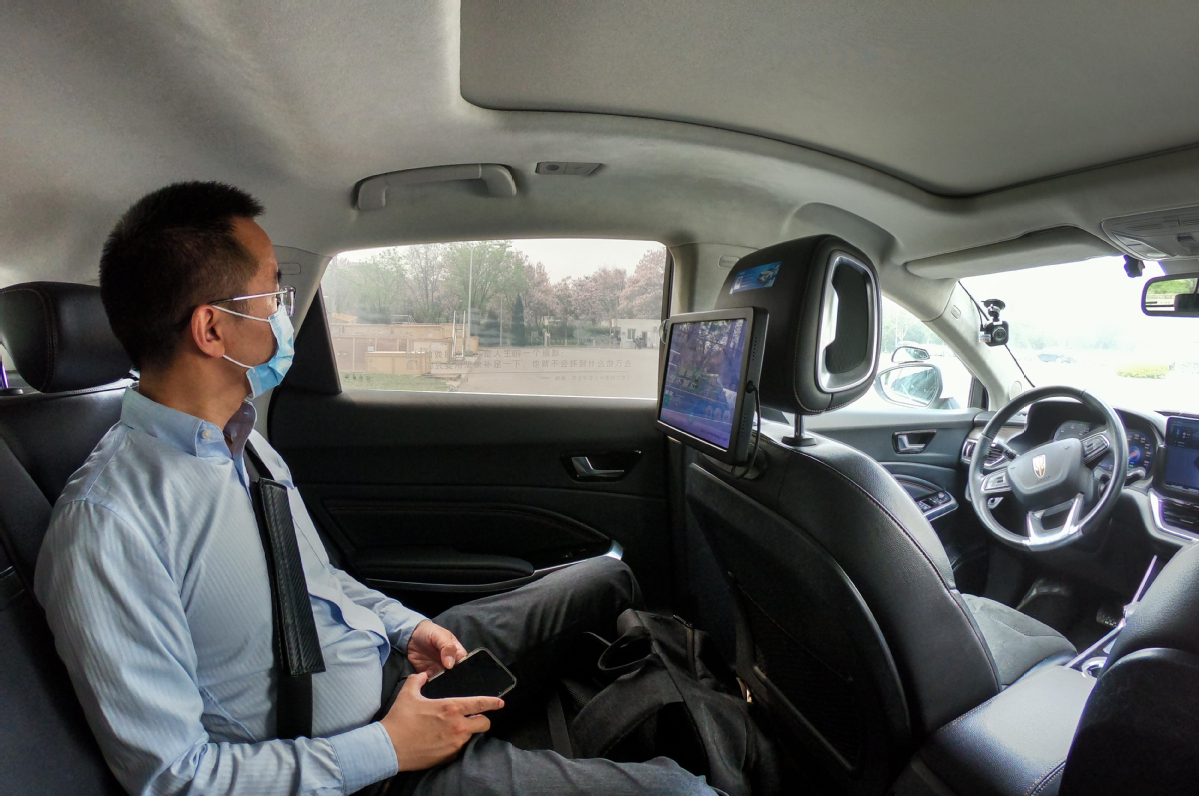Autonomous driving law urged as testing underway

A passenger experiences a self-driving vehicle at Beijing Economic-Technological Development Area in Beijing on April 25, 2022. PENG ZIYANG/XINHUA
More efforts are needed to speed up legislation around autonomous driving technology and bolster the large-scale commercial application of self-driving vehicles, political advisers and experts said.
Lian Yuming, president of the Beijing-based International Institute for Urban Development, said autonomous driving is a tech frontier deeply integrated with new-generation information technologies, including artificial intelligence, edge computing, mobile communications and smart cities.
Lian said it has a significant impact on the country's economic development and global competitiveness.
Autonomous driving, which involves self-driving vehicle technologies, is regarded as a crucial part of developing new quality productive forces.
Noting that autonomous driving technology is an important pillar of intelligent manufacturing and vital to smart city development, Lian, who is also a member of the 14th National Committee of the Chinese People's Political Consultative Conference, the country's top political advisory body, said accelerating the legislative process for self-driving technology has become the top priority for bolstering the development of the autonomous driving industry.
He pointed out that there are some bottlenecks, such as the high cost of software and hardware devices, inadequate intelligent infrastructure and insufficient application scenarios that hinder the development of the technology.
In his proposal to this year's two sessions, Lian suggested that laws regarding self-driving should be included in the legislative plan of the Standing Committee of the National People's Congress, China's top legislature, also strengthening research on legislation that covers liability, privacy protection, data security and regulatory compliance.
He also called on the government to step up support for first-tier cities, such as Beijing, Shanghai and Shenzhen in Guangdong province, to expand the scenarios for self-driving vehicles in a wider range of fields, and further promote their commercial application.
Wang Xianjin, vice-president and chief engineer of the China Academy of Transportation Sciences, which is affiliated with the Ministry of Transport, said in the past year, the testing and operation of fully driverless vehicles had accelerated significantly in China, laying a good foundation for the large-scale application of autonomous driving technology.
Wang, a member of the 14th CPPCC National Committee, suggested that Chinese authorities should speed up the push to formulate and revise policies and regulations supporting the exploration of large-scale commercial applications for autonomous driving vehicles.
Zhang Ning, vice-president of self-driving startup Pony.ai, said the company is ramping up efforts to promote the application of passenger-carrying and cargo-carrying intelligent connected vehicles on a larger scale, enrich road testing scenarios and boost large-scale commercial use of the technology.
As autonomous driving technology continues to mature, the sector is poised to consolidate in the coming years.
A report by global consultancy IHS Markit said the market size of China's self-driving taxi services is expected to surpass 1.3 trillion yuan ($180.7 billion) by 2030, accounting for 60 percent of the ride-hailing market nationwide.
In recent years, China has introduced a series of policies to promote the development and commercialization of self-driving technology. In November 2022, the Ministry of Industry and Information Technology and the Ministry of Public Security unveiled a draft guideline to expand road tests for autonomous driving vehicles nationwide.
Shenzhen started allowing fully autonomous vehicles without human drivers to run on certain roads starting Aug 1, 2022, when a local regulation on smart and internet-connected vehicles went into effect.
Lyu Jinghong, an analyst of intelligent mobility at research company BloombergNEF, said, "Continuous testing on public roads, eased regulations, as well as cost reductions in autonomous vehicle manufacturing, will help accelerate the deployment and commercialization of self-driving cars."
Lyu said clear regulations at the national level will encourage local governments and autonomous driving companies to quicken the use of self-driving technology, which is crucial for achieving commercialization targets.
Photos
Related Stories
- Robotaxis get green light for airport run
- Chinese LiDAR companies take the lead in autonomous driving innovation
- Self-driving police patrol cars tested on Beijing roads
- Urban air traffic opened for self-driving passenger aircraft in China's Shenzhen
- Shanghai opens more roads for self-driving car tests
- China hits fast-forward button for commercialization of autonomous driving
Copyright © 2024 People's Daily Online. All Rights Reserved.









